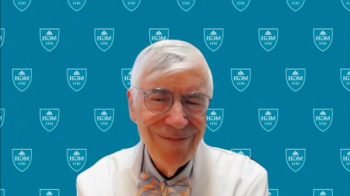
Treatment Landscape and Choice of Therapy in Lupus Nephritis
Rheumatology and nephrology experts provide an overview of the pharmacologic treatment options in lupus nephritis and discuss recent FDA approved therapies belimumab and voclosporin.
Episodes in this series

German Hernandez, MD, FASN, FACP: Even though lupus nephritis is an important disease, there aren’t that many FDA-approved treatments for it. We’ve actually repurposed other medications that we use in terms of immunosuppression for the treatment of lupus nephritis, even though they haven’t been FDA-approved. We’re talking about using steroids, such as prednisone, which is almost like a shotgun approach. The problem with steroids is that they carry a lot of [adverse] effects, including an increased risk of developing hypertension, diabetes, cataracts, and a lot of body changes in patients who are young women. They can develop swelling, an excess of tissue in their face and back, as well as stretch marks. The use of prednisone has been repurposed for lupus nephritis, and it works to some extent, but it has a lot of [adverse] effects.
The other medications that we use that aren’t FDA-approved include mycophenolate mofetil, which is another immunosuppressant, and cyclophosphamide, which I now rarely use. We favor the use of mycophenolate mofetil. There are 2 FDA-approved treatments. One is Benlysta [belimumab], which is a monoclonal antibody against B cells that was studied and approved as an IV [intravenous] formulation, and there’s also a subcutaneous formulation. That’s approved for lupus in general, but also more recently, for lupus nephritis. That’s one of only 2 medications that are FDA approved.
The other is Lupkynis [voclosporin], which is a novel calcineurin inhibitor. It’s also an immunosuppressant. It decreases T-cell activation and function, and it’s thought to cause the podocytes in the kidney to become more stable. Those are thought to be the 2 mechanisms for its action in lupus nephritis. Again, we’ve repurposed a lot of drugs that are not FDA approved for lupus nephritis. Currently, we only have 2 FDA-approved medications for the treatment of lupus nephritis, one being Benlysta as either an IV infusion or subcutaneous injection, and Lupkynis, the only oral option, a novel calcineurin inhibitor.
It has now become the standard of care for my practice to use steroids like prednisone, with a rapid reduction in the dose to minimize [adverse] effects, along with mycophenolate mofetil. That’s basically what I consider the standard of care, even though neither of those 2 drugs are FDA approved. Now that we have a couple more options, historically, because Benlysta was approved as a general lupus medication, I haven’t reached for it too often for use in patients with lupus nephritis. It’s traditionally been more of a rheumatology drug, because it was initially approved for lupus without necessarily lupus nephritis. I tend to stick to mycophenolate mofetil with prednisone.
Now that we have Lupkynis, given that it’s an oral medication and doesn’t require any therapeutic levels to be monitored, I am reaching out more and more for the combination of mycophenolate mofetil, prednisone with a rapid taper, and Lupkynis. I haven’t used much of the Benlysta, given that it’s an injectable and has historically tended to be more of a rheumatology drug, initially being approved for patients with lupus without lupus nephritis per se, although it does now carry that indication as well.
Ellen Ginzler, MD, MPH: There are a series of guidelines that were developed in 2012 giving advice about how to treat the more severe forms of lupus nephritis, and CellCept [mycophenolate mofetil] is one of those standard of care drugs. The question now comes up of whether you should add one of these 2 new drugs that were approved as soon as you diagnose lupus nephritis, or whether you should treat with a standard of care first, and if the patient doesn’t respond well, or doesn’t respond completely, then add one of these 2 drugs. We don’t have an answer to that because the approval for those 2 drugs is too recent. They weren’t even approved a year ago. We have less than a year of experience with those 2 drugs, other than the investigational stages. Those are answers we’re looking for right now.
Transcript edited for clarity.
Newsletter
Stay ahead of policy, cost, and value—subscribe to AJMC for expert insights at the intersection of clinical care and health economics.








